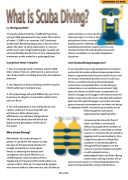DiveMindanaoInauguralFINAL.pdf
by Wolfgang MehlOn purely technical terms, SCUBA diving meansusing SCUBA equipment to stay under the surfaceof water. SCUBA is an acronym: Self-ContainedUnderwater Breathing Apparatus, a device whichallows the diver to carry externally (i. e. not justwithin one's own lung) breathing gas (usually air)and comfortably breath from it, thus allowing freemovement under water for a prolonged time.In practical terms it implies:1. You are staying inside a medium which is 800times denser than air, which exerts a pressure onyour body which is multiple times the atmosphericpressure.2. You depend on devices failing of which may belife threatening in multiple ways.3. Your physiology will work difffferently, you mustlearn how to adapt to it and within which limitsyou can do so.4. You will experience a new world, forms andcolours unknown in your daily life; youwill move in three dimensions,effffortlessly; you will learn things aboutlife and even about yourself which arebeyond your perception while out ofthe water.Why Scuba Diving?Motivations for scuba diving areplenty: it can be for the reason to relaxbecause of the perceived absence ofweight and ability to move aboutfreely, to admiring the beauty andstrangeness of marine life forms, tosatisfying your curiosity about what ishappening in that part of the world where youcannot walk or drive to. It is pursued by peoplewho cannot walk on their own but are still able toswim and dive, or even by those who have losttheir eye sight. It is also a social activity witheducational value: one basic safety feature is thebuddy system, whereby always two divers arewatching each other, ready to assist in anysituation where the dive buddy encountersdistress, problems, or possibly dangeroussituations.Isn’t Scuba Diving dangerous?If you would kit up scuba equipment and walk orjump into the water without proper preparation,there is a good chance that you would not surviveor remain unharmed; but the same is true if youdrive a car without having received properinstructions and qualifification. Scuba diving isindeed done in an extreme environment: highpressure, dense air, both major components ofwhich (nitrogen and oxygen) will interact with thebody in ways they do not at standard atmosphericpressure; the rapid changes in pressure can havegrave traumatic consequences to divers not beingin adequate health, not reacting correctly, or notfollowing precise protocolsregarding their depth profifiles.Comparing the risk with that ofother activities is notoriouslydiffiffifficult but published numbers offatal incidents, according to varioussources, is similar to those related tojogging and to road incidents. Alsoa signifificant portion of fatal diveaccidents is not attributable todiving itself but happens on thesurface (e.g. boat related accidents)or with people having apathological heart condition. Beingunder water during a stroke will ofcourse result easily in a long delay between theevent and possible life-saving interventions. 20 of 24LEARNING TO DIVE
